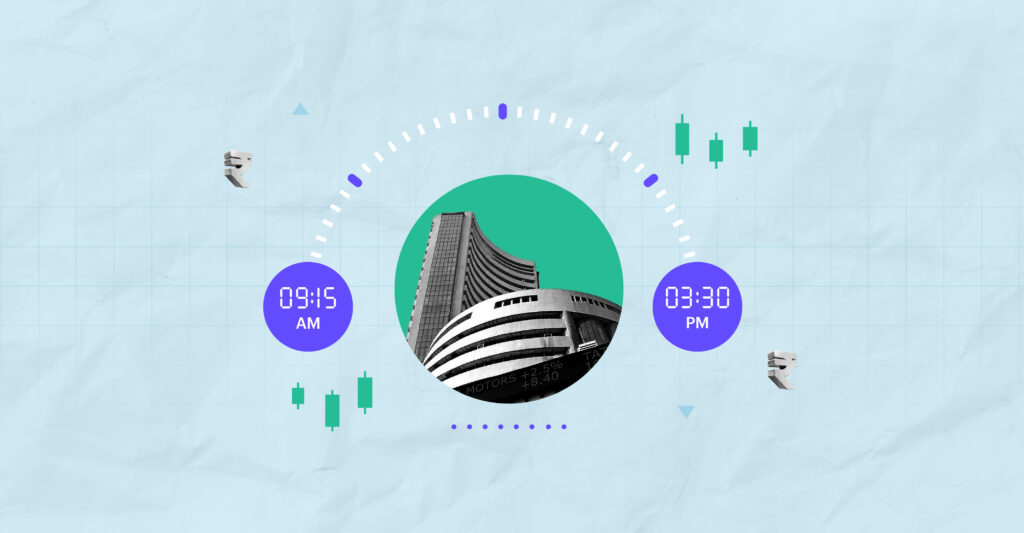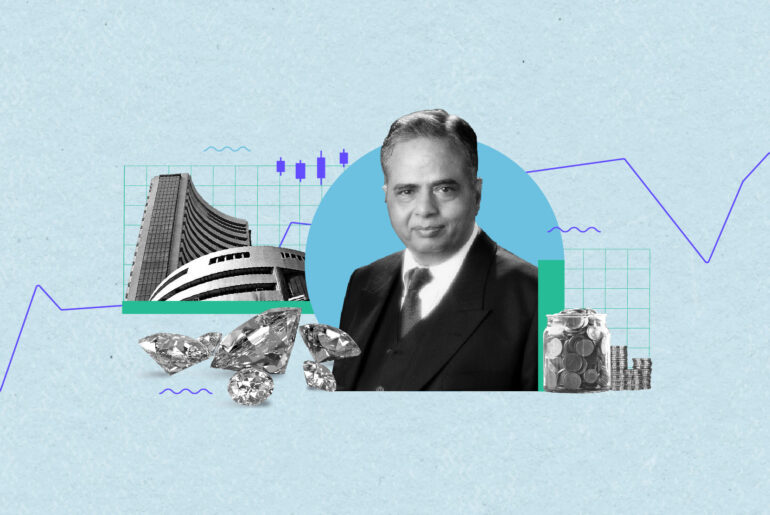Last Updated on Oct 5, 2022 by Vyshakh
To invest in stocks, you must understand several factors associated with them. Amongst the various aspects, stock market timings are the basic yet essential factor a new investor should know. A trading session is divided into three phases: pre-opening session, trading hours and post-closing session. Read below to understand the Indian stock market timings.
Stock markets allow the investors to trade only at specific timings from Monday to Friday. The Indian stock market timings are from 9:15 AM to 3:30 PM. All the stock exchanges, including the Bombay Stock Exchange (BSE) and National Stock Exchange (NSE), follow these timings.
Table of Contents
Pre-opening session
The pre-opening session in the stock market in India is from 9:00 AM to 9:15 AM. This is further divided into three slots as listed below:
1. 9:00 AM to 9:08 AM
You can place stock orders during this slot. You are allowed to modify or cancel this order later. Once the market trading hours begin at 9:15 AM, the orders placed in this slot will be given preference accordingly.
2. 9:08 AM to 9:12 AM
These 4 minutes are used to determine the opening price of the security, which is done by matching the supply and demand of the stocks. During this time, no orders from the investors are taken.
3. 9:12 AM to 9:15 AM
These 3 minutes act as a buffer between the pre-opening session and the regular trading hours to allow a smooth transition. You will not be able to place or modify any order during this slot.
Trading hours
Now coming to the core stock market trading time, from 9:15 AM to 3:30 PM. This is when you can modify, cancel, buy or sell the stocks from both BSE and NSE without any limitations. The price of the stocks keeps fluctuating according to the demand and supply during this period. During these regular trading hours, bilateral order matching is followed where stocks available for a sell order will be matched with the buy order of the same price and vice versa.
Post-closing session
At 3:30 PM, the normal trading session comes to an end. After this comes the post-closing session, which is from 3:30 PM to 4:00 PM. The post-closing session is divided into two slots.
1. 3:30 PM to 3:40 PM
These 10 minutes are to calculate the closing price of the stock, which is determined using the weighted average price of the stock traded between 3.00 PM to 3.30 PM. This is a crucial session of the trading day as the closing price of major indices like Nifty and Sensex are also calculated based on the weighted average prices of all the stocks on that day.
2. 3:40 PM to 4:00 PM
This is the last slot for the day, where stocks can still be bought or sold. And if there are sufficient buyers and sellers of stocks, the orders will be confirmed.
After Market Orders (AMO)
After 4:00 PM, i.e., the post-closing session, no transactions happen. The investors can place after market orders, which would be issued at the opening market price on the next trading day.
Stock market muhurat trading time
In the stock market trading, any regional holidays are informed prior. However, as Diwali is considered an auspicious day, trading is available for only one hour, which is called Samvat. This muhurat trading consists of a pre-opening session, trading hours and a post-closing session. Every year during Diwali, BSE and NSE announce the trading time and date prior.
How to invest in the Indian stock market?
Retail investors can invest in the stock market in India only through brokers authorised by the Securities and Exchange Board of India (SEBI). There are specific steps that need to be taken before you start trading. Analysing the stock based on the company’s historical performance, financials, market conditions and more is an important step.
- In India, retail investors cannot directly buy/sell shares on the stock exchange. They can only do so through a SEBI-approved broker. So register yourself with a broker to start participating in the market.
- Open a Demat account which is used to hold shares and securities in electronic format.
- The brokers can buy stocks on your behalf based on your instructions. If you want to buy any particular company’s stock, you can provide the broker with the price and quantity. Once the market price matches your provided price, the transaction is placed.
You can go through Tickertape Stock Screener to discover stocks based on parameters that matter to you. Learn about the company profile, financials, peers, and corporate actions and only then make an investment decision/place a buy/sell order.
FAQs
1. What is the stock market open time in India?
The stock market opening time in India is 9:00 AM. For regular trading, the market is open from 9:15 AM.
2. What is the stock market close time in India?
The stock market closing time in India is 3:30 PM. However, trading can take place from 3:40 PM to 4 PM, if there are sufficient buyers or sellers.
3. What is the stock market Diwali muhurat trading time?
The stock market Diwali muhurat trading time varies every year. Major stock exchanges BSE and NSE announce the date and timings on their website ahead of time.
4. What are the stock market timings in India on Saturday?
Usually, the stock market in India is closed on Saturday and Sunday. However, the market can be open on these days if any special trading sessions are announced.
5. What are the world stock market timings?
The world stock market timings vary with each country. We’ve listed the timings of the top three largest stock markets in the world; New York Stock Exchange (NYSE) operates from 9:30 AM to 4:00 PM (Eastern Time), Nasdaq Stock Market timings are 9:30 AM to 4:00 PM (Eastern Time), and Shanghai Stock Exchange (SSE) operates from 9:30 AM to 11:30 AM and 1:00 PM to 3:00 PM (Central Standard Time).
6. What are NSE stock market timings?
The NSE stock market open and close timings are 9:00 AM and 3:30 PM, respectively. For regular trading, the market opens at 9:15 AM and closes at 3:30 PM.
7. What are stock market timings in BSE?
The stock market timings in BSE are 9:00 AM to 3:30 PM. However, the regular trading starts at 9:15 AM and closes at 3:30 PM.
- Best Mutual Funds for Passive Investors (2025) - Dec 9, 2024
- List of Stocks With RSI Below 30 in India - Dec 9, 2024
- 10 Highest Dividend Paying Stocks in Nifty 50 NSE India - Dec 9, 2024




